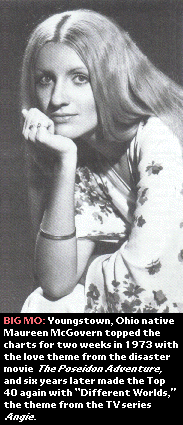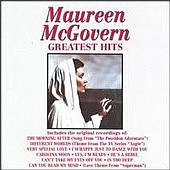|
"The Morning After" Maureen McGovern 20th Century 2010 Aug. 1973 Billboard: #1
The production schedule called for the song to be recorded the following Monday, and Allen wanted to hear the completed tune on Friday. The two songwriters returned to Kasha's home and brewed up some strong, black coffee. "We were at the piano all night," Hirschhorn remembers. "We stumbled in the next morning.... They said, 'It's perfect!'" The song they turned in that Friday was called "Why Must There Be a Morning After?" but Allen and director Ronald Neame wanted a more positive message in their "disaster" film. The title was changed as well. The script was based on a little-known story by Paul Gallico, "The Poseidon Adventure," and the studio thought the public might not relate to the title. A few months earlier, Regan had heard a demo tape of a secretary who was working part time as a folksinger. He liked her voice so much, that when "The Morning After" project came his way, he signed Maureen McGovern (born July 27, 1949, in Youngstown, Ohio) to the label and had her record it. Kasha and Hirschhorn presented McGovern's recording to Allen. "He was very shaken by it," Kasha recounts. "He had never heard of this girl in his life... he asked us what we thought of it and we told him we loved it. We weren't just being Monday morning quarterbacks -- we thought she captured the song beautifully." "The Morning After" was nominated for an Academy Award for Best Song, but was considered a long shot against stronger contenders like Walter Scharf and Don Black's "Ben," which had already been a number one hit for Michael Jackson. "I didn't expect to win," Hirschhorn admits. "I'm a nervous wreck at these things. When they announced the winner, my hands sweated off the gold plating on the Oscar. It turned silver!". It was only after the extra attention the song garnered from winning an Academy Award that it became a hit. It started off slowly, debuting at number 99 on the Billboard Hot 100 dated June 23, 1973. Its chart progress sharply increased in its third week on the chart; it moved 99-86-42-29-20-9 to number one. The Kasha-Hirschhorn-McGovern connection scored again two years later with the theme song from another Irwin Allen film, The Towering Inferno. Performed by McGovern in the picture, "We May Never Love Like This Again" won the Academy Award for Best Song of 1974. Reflecting on the success of "The Morning After," Kasha suggests, "It struck a chord of hope. It can be read as a personalized kind of song. It could be read as a love song. It could be read as a song for a person who's on alcohol or some kind of drug, 'there's got to be a morning after,' meaning getting through the night.... It's just a great song of hope." After her success on the pop charts in the late Seventies, McGovern branched out into other areas of entertainment. She acted on Broadway and television, sang with symphonies and performed duets with Placido Domingo, Mel Torme and Sting. She also established Works of Heart, which brings brings music to caregivers and their patients, after singing at a pediatric unit in Pittsburgh one Christmas Eve. She closed with the hopeful "The Morning After." "As the children's beds were being wheeled back to their rooms, one by one, each patient clung to me with tears in their eyes," McGovern recalls. "One mother thanked me over and over again for making her heart 'smile' -- something she hadn't felt in over a year. I will never forget their faces. I knew, then and there, that I was put on this earth to sing music that comforts and inspires." In August 2022, McGovern revealed that she had been diagnosed with Alzheimer's disease almost a year earlier, after struggling with familiar lyrics since 2018. She announced her retirement from the stage with a poignant social media post, admitting she at first "struggled with the inevitable shock [of the diagnosis] with fear and, frankly, hopelessness." Although she gave up live performing, she began working on a new recording project described as "music intended to heal and inspire children and families" as she resides in a retirement community in Columbus, Ohio. - Fred Bronson, The Billboard Book of Number One Hits, Billboard, 1988.
Taty Star So cute, I'd like to see photo or video of this moment with her and the children... |


